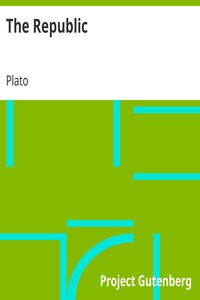| Author |
Plato, 428? BCE-348? BCE |
| Translator |
Jowett, Benjamin, 1817-1893 |
| Title |
The Republic
|
| Note |
Reading ease score: 61.1 (8th & 9th grade). Neither easy nor difficult to read.
|
| Note |
There is an improved edition of this title, eBook #55201
|
| Note |
Wikipedia page about this book: https://en.wikipedia.org/wiki/Republic_(Plato)
|
| Credits |
Sue Asscher and David Widger
|
| Summary |
"The Republic" by Plato is a philosophical dialogue written in ancient Greece around the 4th century BC. It explores the nature of justice, the ideal state, and the role of individuals within society, primarily through the character of Socrates and his discussions with various Athenian figures, such as Glaucon and Thrasymachus. This foundational work in Western philosophy examines themes that remain relevant today, including ethics, governance, education, and the relationship between truth and societal order. At the start of "The Republic," the scene is set with Socrates returning from a festival when he is drawn into a conversation about justice. Older characters like Cephalus introduce the topic by discussing the advantages of wealth and the aspects of aging, leading to deeper philosophical inquiries about the essence of justice. Socrates engages with his companions, questioning traditional definitions and arguing against beliefs that equate justice with self-interest or societal norms. The opening portion establishes a conversational framework where Socrates employs his dialectical method, demonstrating the complexity of justice and hinting at the construction of an ideal state, thus laying the groundwork for profound philosophical exploration throughout the work. (This is an automatically generated summary.)
|
| Language |
English |
| LoC Class |
JC: Political science: Political theory
|
| LoC Class |
PA: Language and Literatures: Classical Languages and Literature
|
| Subject |
Classical literature
|
| Subject |
Political science -- Early works to 1800
|
| Subject |
Utopias -- Early works to 1800
|
| Subject |
Justice -- Early works to 1800
|
| Category |
Text |
| EBook-No. |
1497 |
| Release Date |
Oct 1, 1998 |
| Most Recently Updated |
Sep 11, 2021 |
| Copyright Status |
Public domain in the USA. |
| Downloads |
11694 downloads in the last 30 days. |
|
Project Gutenberg eBooks are always free!
|

